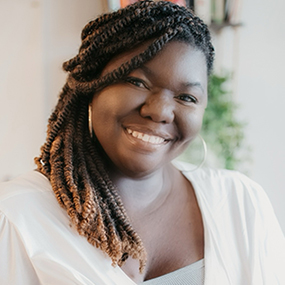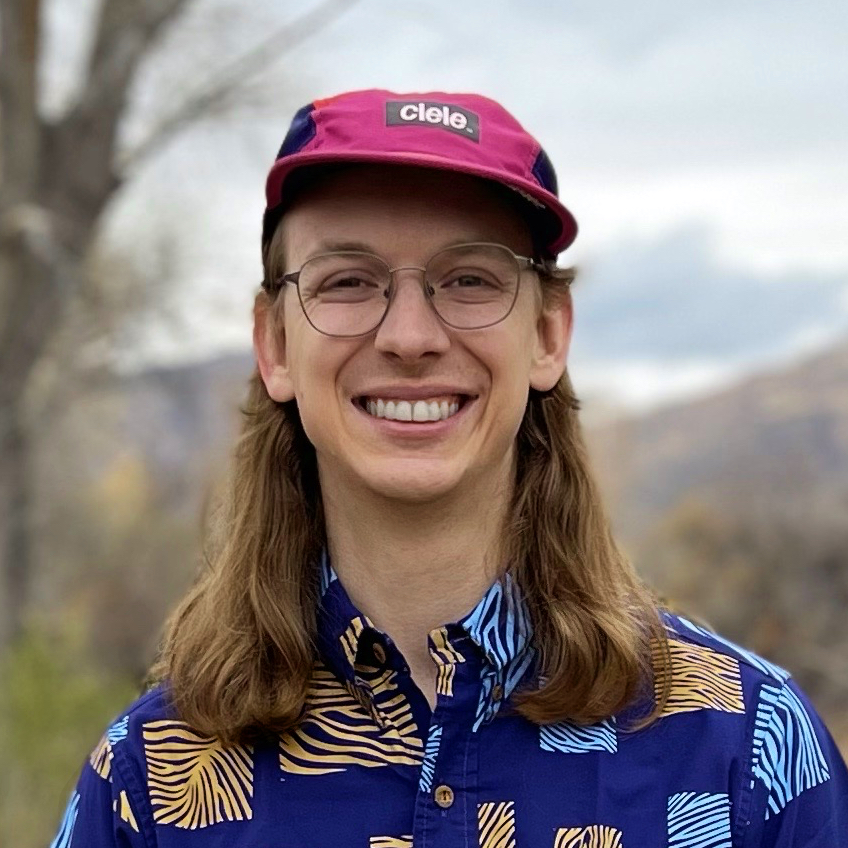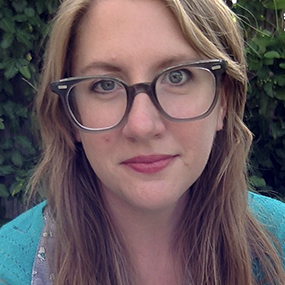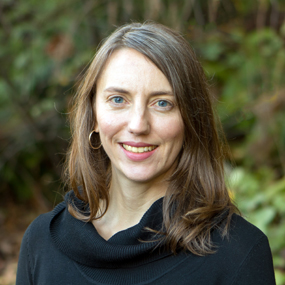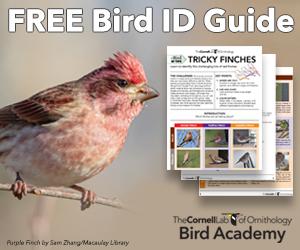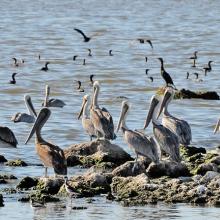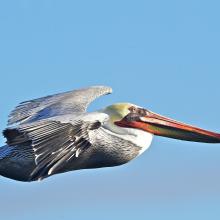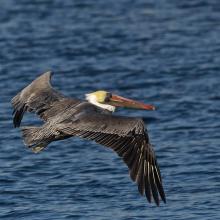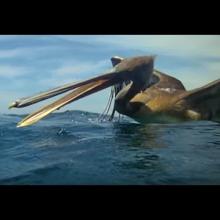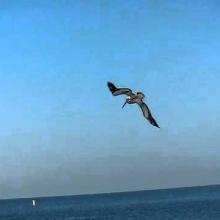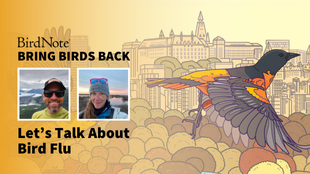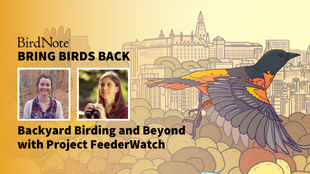

Join BirdNote tomorrow, November 30th!
Illustrator David Sibley and actor H. Jon Benjamin will face off in the bird illustration battle of the century during BirdNote's Year-end Celebration and Auction!
In the Bring Birds Back season finale, host Tenijah Hamilton heads to Tybee Island off the Georgia coast for a day at the beach... picking up trash. She joins Tim Arnold, founder of Tybee Clean Beach Volunteers, to see firsthand how plastics and trash can pose a threat to migratory shorebirds and marine life. And she speaks with Kelly Martin, Texas Coastal Outreach Coordinator at American Bird Conservancy, about some of the actions we can take to solve our problem with plastics.
Tenijah Hamilton: BirdNote Presents.
Tenijah Hamilton: Is that a Pelican up there?
Tim Arnold: Yes, very good.
Tenijah Hamilton: That's my, that's my first Pelican I've ever seen in person.
Tim Arnold: They are awesome. These are brown pelicans.
Tenijah Hamilton: This is Bring Birds Back. I’m Tenijah Hamilton. And for our season finale, we’re going to the beach!
[MUSIC]
I got to go to Tybee Island, a beautiful barrier island off Savannah on Georgia’s coast with sandy beaches near a big salt marsh full of birds. Parts of the island are packed with vacation homes and restaurants, and right beside them are vital ecosystems like sand dunes and tidal creeks supporting all kinds of wildlife. Now, I wasn’t just there for fun in the sun — I was there to learn about the problems plastics pose to our shorebirds and marine life — and to do that, I spoke with two people. First, I met up with Tim Arnold, he’s the founder of Tybee Clean Beach Volunteers. And we went for a walk along the beach, where I spotted his favorite bird: the Brown Pelican.
Tim Arnold: They're awkward and prehistoric and elegant and all wrapped up in the one just amazing machine. When you're sitting on the beach and reading a book or just relaxing and looking out at the coastline, all of a sudden, you'll see those missiles just dive from the air. And they hover over their prey 20, 30 feet sometimes higher, they pull their body together and they dive in and keep their considerable beak close to them until they come back out again and all the water flushes out. And so whatever they got in there is in their beak, they just lift their head and boom, there it is. They'll swallow, whatever it is whole. When I see them dive like that, I do worry that they're coming up with some microplastic.
Tenijah Hamilton: And that brings me to the other person I spoke to about this issue — Kelly Martin, Texas Coastal Outreach Coordinator for American Bird Conservancy. You’ll be hearing from her throughout today’s episode as well. And she broke down the two main threats to wildlife from plastics. First there’s entanglement.
Kelly Martin: which is when a bird or some other animal gets entangled in a piece of trash. Here in Texas, that's often discarded fishing line that a bird gets its legs or wings wrapped up in, or a ribbon that gets tied to a balloon. The bird might not be able to walk or fly, which sort of prevents it from hunting or escaping a predator or doing the things that it needs to do on a daily basis just to survive. And it can also cause injuries. So we see birds that have lost limbs because the fishing line or whatever else that was tangled around its leg got so tight that it caused a cut or an infection, and they lost a limb because of it. So that obviously then has long-term impacts on the survival of that bird.
And then the other category is ingestion. So that's when a bird or some other animal ingests plastic. It can potentially damage the internal organs of that animal. Or birds can sometimes eat so much plastic that it fills their stomach and they think they're full. And so they don't eat and then they can potentially starve as a result of that.
Tenijah Hamilton: Ingestion is exactly what Tim worries is happening to the pelicans we saw on the beach — that they’re gulping down water filled with little bits of plastic that can cause serious harm. It’s sad to think about — but that only makes Tim redouble his efforts to solve our plastic problem. That stubbornness is how he got involved with fighting plastics and marine debris in the first place.
Tim and his wife moved to Tybee about ten years ago, and each night they would go for an evening walk along the beach. But by the time they got home...
Tim Arnold: Our arms will be full of trash, you know? Cause I can't walk by a can or a bag and not pick it up. My wife's the same way. Although she swears a lot when she does it, I don't.
Tenijah Hamilton: My kind of gal.
Tim Arnold: Yeah. And then, you know, after a while it got really frustrating. So we started to walk with buckets and grabbers and then we bumped into other people that were doing the same thing. We were like, what are you doing? It's like picking up trash. And then we just decided let's get a group of people together on Sunday night and do it together.
Tenijah Hamilton: This grew into Tybee Clean Beach Volunteers, which Tim organizes. Over the years, thousands of volunteers have taken time to clean up the shores of Tybee on these beach-sweeps, which happen year-round.
Tim Arnold: I'm surprised how popular this has become. But then again, when I think about it, people that come to the beach care about it. They do. almost everybody that comes here gets it. And doesn't like to see the litter or they'll talk about that. So if you empower them to make it really easy to do something about it, guess what -- they want to do something about it.
Tenijah Hamilton: So you have a beach clean up tomorrow, right. And I'm curious, how much litter, how much plastic are you expecting to get from that cleanup?
Tim Arnold: A remarkable amount. We'll fill those big 18 gallon Rubbermaid containers. So we'll just drag six or seven of those out and fill them all up with trash.
[MUSIC: CALLISON]
Tenijah Hamilton: And so when Tim and I took to the beach, it’s no surprise that almost right away...
Tim Arnold: Look, there's a classic example. Somebody has a drink, just drops it. “Somebody else will pick it up” kind-of-thing. People innocently leave their bottle and they forget. A lot of it is accidental littering where they're just, you know, they bring too much to the beach, it's windy, stuff gets away from them.
Tenijah Hamilton: We see styrofoam cups, colorful plastic straws, discarded plastic water bottles…. And Tim tells me about the biggest culprits of litter here on Tybee:
Tim Arnold: The things we find the most of are kind of inexcusable. Cigarette butts. Straws, you know, you should at least keep track of your straw. It's not that hard. Plastic bottle caps, styrofoam and snack wrappers kind of round out the top five. If we could eliminate those, we could eliminate 90% of the beach trash.
Tenijah Hamilton: Wow.
Tenijah Hamilton: That ranking varies from place to place — for Kelly in the Houston region, fishing line and plastic water bottles are some of the biggest issues — but they all present real problems. And I wanted Kelly to help me understand how much trouble could come from one careless act:
Tenijah Hamilton: So paint a picture for me, if you will. I'm at the beach, I'm drinking from a plastic straw. I mean really well, but I leave the straw at the beach. I forget it, things are a little hectic. Could you tell me how long it would take for that environmental degradation of that straw?
Kelly Martin: Basically, it's not going to break down in any timescale that has any meaning for humans whatsoever. You know, it's hundreds of years at best. Some scientists estimate that like every piece of plastic that's ever been made is still on this planet in one form or another, unless it's been burned. Um, but that's also really bad for the environment too. So that's not a good alternative. Um, so yeah. It's really just not something that we can really comprehend. That plastic is gonna be here well after we're gone.
Tenijah Hamilton: That is kind of beyond the scope of comprehension. The idea that every piece of plastic potentially that's ever been made is still here.
Tenijah Hamilton: Over 8 million metric tons of plastic end up in the ocean every year — and while it might break down into microplastics, that isn’t the end of the problem. According to a 2015 analysis, 99% of all seabird species will have ingested plastic by 2050.
Thinking about that incomprehensible time-scale on my beach walk with Tim, I was excited to find any plastic I could recycle to spare it the same fate. But that wasn’t as clear as I thought...
Tenijah Hamilton: And I get to put my little Pringles top, in the recycling!
Tim Arnold: Not recyclable, unfortunately.
Tenijah Hamilton: Oh, it's not?
Tim Arnold: It's a combination that can't be recycled.
Tenijah Hamilton: Really!? There's so many complexities here. Cause I would have just tossed that in a recycle bin!
Tim Arnold: Right. Wish-cycling, they call it. All plastic ever created, only 9% has been recycled. And that's probably being aggressive number-wise because of the explosion of single use plastic has meant that that rate has dropped considerably. So recycling clearly is not the answer.
Tenijah Hamilton: As we walked along the beach, I’ve gotta admit, I was kind of shocked at how bad the problem is. It felt like an unrelenting deluge of trash that there wasn’t a great solution for. And talking to Tim about that feeling, he says that these clean ups are a kind of sisyphean task.
Tim Arnold: The goal for us is just to try to play goalie here and keep it out of the water the best we can. And more importantly, get people out, picking it up on their own. There's nothing like filling your bucket up with straws and bits of plastic to make you really understand the nature and extent of the problem. That's the main reason we do the beach cleanups, it really evangelizes just about everybody that does it.
Tenijah Hamilton: Kelly Martin organizes a bunch of cleanups as part of her work as well — largely with an educational goal. She also knows there’s a limit to what a clean up can accomplish.
Kelly Martin: Beach cleanups are not going to solve this issue. You know, if your bathtub is overflowing, you don't run and get a mop before you turn the faucet off. You turn the faucet off first and then you go get the mop and the bucket. Cleanups are kind of like the mop and the bucket. Definitely important to get the trash that's already out there out of the environment. But we do need to work on prevention first and foremost.
Tenijah Hamilton: After the break, we’ll talk about that prevention work: how we can use less plastic, and how to take the burden of responsibility off of consumers. That’s coming up — right after this.
AD BREAK
Tenijah Hamilton: This is Bring Birds Back, I’m Tenijah Hamilton. Seeing the plastic problem at the beach firsthand made it really clear that, while individual actions like picking up beach trash or recycling or using less plastics can help, this is a massive problem that needs solutions at a higher level. And Kelly Martin from American Bird Conservancy told me about a bill in Congress that aims to do just that: the Break Free From Plastic Pollution Act.
Kelly Martin: One of the biggest things in that act is what's called extended producer responsibility or EPR. And essentially what that means is it's just taking the responsibility for the disposal and management of plastic waste and putting it back on the company. So right now, if you think about it, we as consumers actually pay for that waste the company produces a plastic bottle. We buy it, we put it in our recycling bin or a garbage bin. And then the city or local municipality comes and takes it away. But we pay for that service with our tax dollars or with our utilities. And so the company is producing all this waste get off scot-free. they don't have to take into account the disposal of all of this single use, plastics when they're manufacturing these things. And so essentially it would just take that cost and put it on the producers. It also has some incentives for recycling. I think it would outlaw certain single use plastics entirely. It's really these large scale changes that we need.
You know, we focus a lot on teaching people about the issue and talking about things that they can do in their daily life to make a difference, like using a reusable water bottle or saying no to straws or whatever it is. But at the end of the day, that's not going to be the thing that stops plastic from entering our oceans. We really need these big, large changes on the level of companies making these changes or governments putting regulations and policies in place to set a new standard. Of course individuals have a role to play in making that happen. You know, we can contact our representatives and, you know, as consumers we can drive the market a little bit. Um, you do see some companies starting to think about new ways of designing closed loop systems and things like that. But I think ultimately these changes are going to have to come from large scale policy changes. So that's why the break free from plastic pollution act is really exciting. And hopefully it gets passed in Congress sometime soon.
Tenijah Hamilton: Legislation like this would be a huge win for sustainability, and would give consumers more and better choices to help the environment. Tim Arnold — of Tybee Clean Beach Volunteers — he feels that’s an essential part of any solution big enough for the problem at hand.
Tim Arnold: It's hard to avoid. It really is. If you give people a choice, a lot of people will take that choice. You know, I don't want to be part of the problem. I want to be part of the solution, but a lot of times you don't have a choice. Here's your styrofoam cup. You want that drink? Here it is. It comes with a straw.
Tenijah Hamilton: So, getting corporations to step up via legislation is what we really need to solve this for the long term. But in the meantime, we can reduce our reliance on single use plastics through alternatives, like reusable water bottles or metal straws. We all have a role to play in the sustainability movement — though not everyone’s contribution will look the same.
Kelly Martin: We don't want to be shaming people who don't have another option, like you can't go to Flint, Michigan and tell them not to use plastic water bottles. You know, and there's people with certain disabilities that need plastic straws.
Tenijah Hamilton: Beyond our own use of plastics is what’s happening in our communities — while marine debris is a global problem. A great way to pitch in is with clever, local solutions. Like on Tybee, Tim noticed one of the big sources of trash:
Tim Arnold: One of the most prevalent things we have, uh, and that creates a lot of the microplastic is beach toys, just cheap plastic that people leave behind. I think people think, well, I can't take this back with me. Maybe someone will use it, but the reality is nobody walking a beach is going to take an abandoned beach toy because they don't know it's abandoned. They think it's somebody's toy, and it just becomes microplastic in a New York minute. And it just degrades. You know, the effect of the sun in a week. It goes from firm plastic to brittle plastic in a week just from sun degradation. And if it gets into water, it just accelerates the breakdown.
Tenijah Hamilton: Realizing this, Tim and others were able to do a few things to address the issue. First, Tybee Clean Beach Volunteers look for and collect abandoned beach toys before they can degrade. Then, they take them, they clean them and donate them to a local cottage rental place that lets their visitors use them for free — with the promise of bringing them back. And they’ve even worked with some of the stores along the beach that sell toys to reduce their impact.
[MUSIC]
Tim Arnold: The campground sells beach toys, but they have a big box of reusables. And so when somebody wants to buy a beach toy, the first thing they say is, you know, we have some free ones right over here you can take. And people will put it back on the shelf and not buy it. That was a pretty big event for them to do. Cause when I first approached them with the idea, they're like, “you know, we sell beach toys…” I’m like “I know!”
Tenijah Hamilton: We might lose a little bit of money!
Tim Arnold: Yeah. You know what, they are so into it.
Tenijah Hamilton: Knowing there’s a place to bring the toys makes people want to return them! People feel good about it — like Tim said earlier, people want to help and be a part of the solution. They just need to have good choices available.
To deal with the big fishing line problems that Kelly sees, she told me about putting up little receptacles on boardwalks and near fishing hotspots to give fishermen an easy, convenient, and environmentally friendly option — and when it’s there, people take that option! These are solutions we can all be a part of — all it takes is noticing the problem and speaking up.
Tim Arnold: You do not have to be an expert in anything to tell your local government official or favorite restaurant what you think about the plastic problem.
Tenijah Hamilton: OK, now let’s say you go to the beach and you want to do a little better. First, try to bring as much reusable stuff as you can — you won’t want to forget those at the beach. If you’re buying new beach towels and toys, take the plastic wrap off of them at home. And Kelly gave some advice on what to do with the trash that we do inevitably create there:
Kelly Martin: Taking your trash home with you is a huge one. You know, you mean well and you throw your trash in the trash can that's at the beach, but sometimes those trash cans don't get picked up before the high tide comes in and they get knocked over. Or sometimes even a bird will fly into the trash can and the trash goes everywhere or, you know, So filled and overflows that trash is falling out. With backpacking, there's like a pack-it-in, pack-it-out mentally. I kind of feel like we should have that mentality everywhere we go. You know, if you go to the park, if you go to the beach, just think about the trash that you're producing and consider taking it home to dispose of it instead.
Tenijah Hamilton: And the final big thing to think about is — sharing these ideas with others! And doing so in a thoughtful and inviting way.
Tim Arnold: We try to tell our volunteers, it's not a contact sport, you know, the worst thing you can do is turn somebody off with your preachy attitude. The best thing they can do is just be a quiet example-setter. You see people when I'm with a bucket and coming towards them, they're looking at their own area and starting to pick up their own trash. Cause they don't want to be the jerk. That's leaving it there!
Tenijah Hamilton: Wrapping up our beach cleanup, I couldn’t help but feel worried for the sea turtles and the migratory shorebirds that nest here on Tybee. I couldn’t begin to keep track of all the trash we saw. And I’ve been at this for like, an hour. Tim’s been doing this for a decade — and I want to know, what keeps him going? What gives him hope?
Tim Arnold: Almost everybody that finishes a beach cleanup is changed by what they see and what they experience. We got a lot of girl scout troops that come out and they do a beach cleanup for their take action coastal badge. And you know, they're really angry little Girl Scouts when they come off there and see all that crap.
Tenijah Hamilton: Good!
Tim Arnold: Yeah, exactly. So the kids are really what gives me. the most hope. I, you know, I haven't met a kid that came off the beach and was unimpressed. They're little advocates when they come off the beach. And they're the ones pestering mom and dad.
Tenijah Hamilton: First of all, I love the imagery of, uh, angry girl Scouts, particularly I was a girl scout in, uh, Brooklyn, New York, a little different, a little different from the coast, but I love that. And I love that harnessing that kind of, that passion and that curiosity to something good.
[MUSIC]
Thank you so much, Tim.
Tim Arnold: Well, thank you. I, like I said, I'm, I'm thrilled. You are drawing attention to the plight of our bird friends.
Tenijah Hamilton: Big thanks to Kelly Martin, the Texas Coastal Outreach Coordinator at American Bird Conservancy, for all her insight on the issue as well. You can find links to great resources about the Break Free From Plastic Pollution Act, some more ways to use less plastic, info about recycling, and lots more at our website, BirdNote.org.
And with that — cue the bells, horns and whistles — we’ve officially come to the end of season one of Bring Birds Back.
I want to give a huge thank you to you all for listening. It means a lot. Thinking about my journey so far, from “Bird Girl in Training” to host of Bring Birds Back, where I’m just in the thick of learning all about our avian friends...it’s wild how much I’ve grown.
A couple of the biggest things that stood out for me? The concept of scope and time. I really remember Adam C. Smith talking about that 3 billion birds number and it being almost incomprehensible, and I felt similarly listening to Kelly speak about environmental degradation of plastic. I walked into that conversation thinking, sure, plastic may not break down in my lifetime but the notion of every piece of plastic that has ever been...plastic’d, still being around somewhere just plasticing is mind boggling.
Another thing? Interconnectedness. When I chatted with Sheridan Alford in our second episode, about Black Birders Week, she really underscored just how vital our individual and collective experiences in nature are to preserving and protecting it. And for me, it was a framework for belonging. Similarly, in our episode about native plants, Desiree Narango spoke about seeing all of nature as part of a web, rather than a chain. And as I’ve been learning about how my actions, your actions, and frankly people’s inaction, contribute to the loss of our bird-friends and the changing climate we see today, I feel way more “a part of something bigger” than I ever did before.
This experience really is for everyone. And I can’t wait to expand our flock and share this with even more people next season. Stick around, tell your friends — and together, we’ll Bring Birds Back.
[Credits Song]
Bring Birds Back is produced by Mark Bramhill and me, Tenijah Hamilton.
We could not have done it without our incredible team:
Our wonderful editor, Oluwakemi Aladesuyi of Rough Cut Collective.
Our content director and fearless leader, Allison Wilson.
Our lead science advisor, Trina Bayard.
And all the amazing folks who have helped out in so many ways behind the scenes this season: Conor Gearin, Sam Johnson, Jason McCue, Shelly Ellison, Katie Meyer, Viki Merrick, and Rehka Murthy.
Music is by Cosmo Sheldrake and Blue Dot Sessions.
And one final, heartfelt thank you to the sponsor of this inaugural season of Bring Birds Back, the Cornell Lab of Ornithology. Check out all they have to offer, like Bird Academy online courses and the Merlin ID app — they just added a super cool sound-ID tool so you can identify the birds you’re hearing — check it out at All About Birds dot org.
Thanks for listening everyone — until next time.
Bring Birds Back is sponsored by the Cornell Lab of Ornithology.
About guest Kelly Martin:
Kelly Martin is American Bird Conservancy’s Texas Coastal Outreach Coordinator. Kelly has a bachelor’s and a master’s degree in Marine Affairs, and her career has ranged from working as an environmental educator in The Bahamas, to tracking down invasive crabs in Washington state, and working as a policy fellow on Capitol Hill. In her role at ABC, Kelly runs the SPLASh (Stopping Plastics and Litter Along Shorelines) program based in Houston, TX, where she uses her experience in environmental science, education, outreach, and policy to engage a wide variety of stakeholders in the effort to tackle trash pollution in Texas.
About guest Tim Arnold:
Tim is the founder of Tybee Clean Beach Volunteers, the group that hosts beach and marsh clean ups all around Tybee Island, and co-founder of Fight Dirty Tybee, the Island’s anti-litter organization. In the past 6 years, they’ve hosted 350 clean up events involving over 10,000 volunteers, and have removed 400,000 cigarette butts from the beach. Tim has organized trash-to-art projects, spoken at youth events and public panels about plastic pollution, worked with local restaurants to reduce single-use plastics, and consulted with the City of Tybee Island on implementing a smoke-free beach ordinance and developing local recycling programs. He has served on several City committees, mostly focused on sustainability, and was an inaugural Board member of the Savannah Chatham Sustainability Coalition, producers of Earth Day Savannah.


